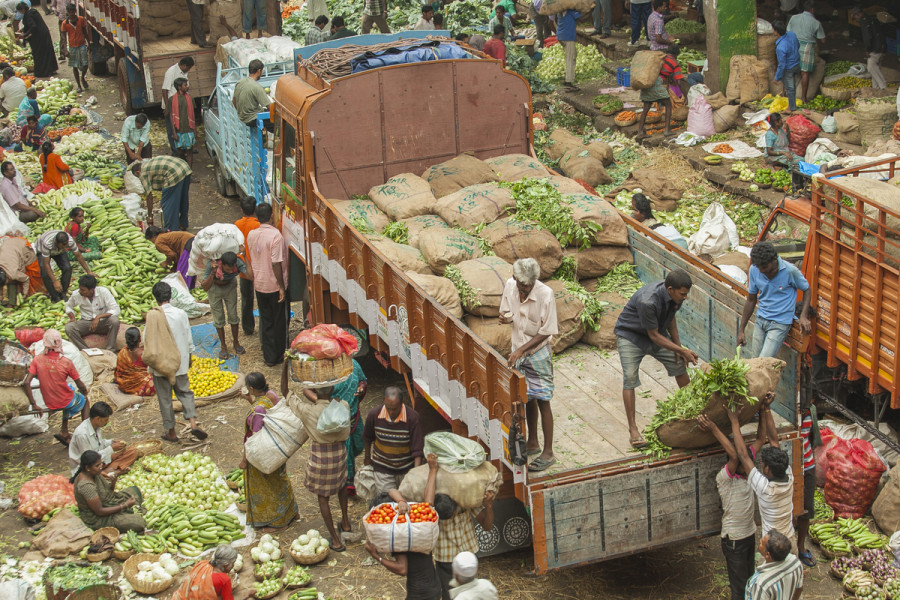Columns
We can’t keep importing food
Increasing dependence on the market to supply food may not be feasible in the days ahead.
Madhukar Upadhya
In a given system, be it biological, economic or any other, if the purpose of the modus operandi adopted is to merely maintain the stability of specific system components, the system’s overall stability could be compromised. Our food production system seems to be suffering similarly. We focus on the supply of chemical fertilisers, seeds and pesticides which, despite being essential components, are only part of the whole system. We haven’t paid adequate attention to the health of the core components, such as soil and water, which are in a state of consistent ruin. Catastrophic water erosion in our hills and mountains has resulted in loss of organic carbon and nutrients, and decline in soil biodiversity for long. Imbalanced use of urea has further harmed the soil.
We’re constantly reaching new depths for groundwater in the Tarai. Examples from Saudi Arabia and elsewhere show that depletion of groundwater led to the collapse of farming prospects. We are heading in the same direction. The drying of springs and streams in the hills has displaced farmers for a few decades now. What’s alarming is we don’t even have the steady income required to continue importing food from elsewhere; meanwhile, food imports have grown unabated.
Rising imports
Even during the nationwide lockdown, while incomes dwindled, Nepal imported cereals, vegetables and fruits worth Rs22 billion in two months. In fact, we have been importing over 5,000 tonnes of cereals and 1,000 tonnes of vegetables every day in addition to other food items. The irony is that the money for these imports comes from the remittance primarily earned by people from farming families who were pushed to join the labour market when shrinking production meant they couldn’t feed their families, much less pay for healthcare and education.
Thousands of Nepali youths working in India had barely returned to the safety of their homes during the pandemic before they were forced to go back to their jobs. This epitomises how our dependence on remittance has become so unavoidable, it’s fundamental. This restoration of remittance flow may help support our food security, but we need to shift our concern from the stability of just food security and basic economic activities to the larger, overall production system. Paradoxically, the increasing dependence on remittance has progressively weakened our social capital, an essential component for farming communities required to continually manage land and water. We’re in a downward spiral.
Covid-19 is exacerbating the already widening gap between the rich and the poor. Increasing dependence on the market to supply food may not be feasible in the days ahead, especially in the post-Covid era, when food is likely to be more expensive and inaccessible for many.
It’s hard to reconcile with the idea that the political leaders who fought for democracy no longer understand this problem. In a democratic system, the elected officials represent the people and address their concerns. Frustration seems to grow when these elected leaders fail to meet the expectations of citizens, and more so when they’re quiescent when confronted by people’s problems. When decisions are made by a few elected individuals divorced from the reality citizens face, genuine problems remain unaddressed.
People’s voices matter
In a democracy, people’s voice governs the people. The public response to the proposed restoration plan for Rani Pokhari exemplifies this democratic process. The fancy scheme announced by Kathmandu Metropolitan City consisted of building a concrete boundary around the pond, and building the temple using reinforced concrete, along with fountains and a poolside café. After strong protests from the people and heritage conservationists, these plans were dumped, and the pond and temple were restored in their traditional style.
Unfortunately, similar public engagement is absent from agriculture. As long as the market makes food readily available, no questions are asked when the government fails to ensure domestic production. For instance, the failure to supply fertiliser for this year’s summer crops was not only an administrative question; it was an example of how planners fail to prepare. Farmers couldn’t get fertiliser despite the fact that importing it is a regular job for the government. If planners fail to plan for contingencies in such routine work, how can we expect them to plan for erratic occurrences like landslides and floods or slow occurring problems of soil and water degradation, which have consistently undermined our food production system? Sadly, no one was held responsible for failing to import fertiliser, except the contractors who failed to deliver. Unless people in positions of power are held accountable, it’s hard to imagine how such problems will ever go away.
From the government’s perspective, everything seems to be fine: the economy is still intact, remittance hasn’t been as badly affected as expected, and projects are being implemented as planned. This narrative infers that our government either doesn’t seem to understand the problem or isn’t in a hurry to tackle such systemic issues. Our hamartia, as a populace, is that we ignore the larger problems and instead engage in analysing trivial matters that have little bearing on the issues at hand.
We can’t avoid reality by burying our heads in the sand like ostriches. Imported food fails to answer long-term questions. Within the limitations of geography, culture and the economy, we have no alternative but to work towards strengthening our production base. The essence of a federal democratic system is to engage people at the local level, to find solutions to local problems. We can’t allow it to end up being reduced to only winning the next election through democratic processes.
Critical times demand answers to uncomfortable questions beyond merely improvements to system components. What steps has the state taken to prevent water-induced disasters that destroy our farmlands every year? What measures have been adopted to reduce soil and water degradation? Is our land not capable of producing enough, and if so, what alternate plans are there to ensure food security? Can we increase food production by bringing more land under agriculture at the expense of forest cover? We must ask these questions without hesitation. And we must unflinchingly demand answers.




 14.24°C Kathmandu
14.24°C Kathmandu















